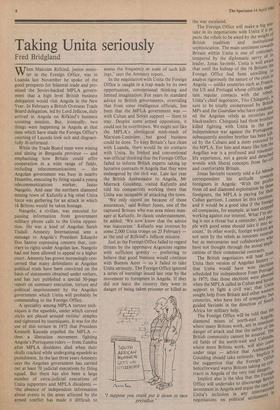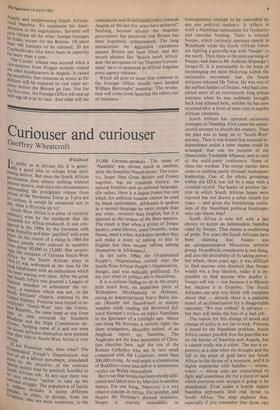Taking Unita seriously
Fred Bridgland
When Malcolm Rifkind, junior minis- ter in the Foreign Office, was in Luanda last November he spoke of the good prospects for bilateral trade and pro- mised the Soviet-backed MPLA govern- ment that a high level British business delegation would visit Angola in the New Year. In February a British Overseas Trade Board delegation, led by Lord Jellicoe, duly arrived in Angola on Rifkind's business scouting mission. But, ironically, two things were happening in Angola at that time which have made the Foreign Office's courting of Launda look sick and disgrace- fully ill-informed.
While the Trade Board team were wining and dining in Benguela province — and emphasising how Britain could offer cooperation in a wide range of fields, including telecommunications — the Angolan government was busy in nearby Huambo, executing by firing squad a young telecommunications worker, Isaias Nangolo. And near the northern diamond mining town of Kafunfo a big rebel Unita force was gathering for an attack in which 16 Britons would be taken hostage.
Nangolo, a civilian, was executed for passing information from government military phone calls to the Unita opposi- tion. He was a kind of Angolan Sarah Tisdall. Amnesty International sent a message to Angola's President Eduardo Dos Santos expressing concern that, con- trary to rights under Angolan law, Nangolo had not been allowed to appeal to a higher court. Amnesty has grown increasingly con- cerned that many defendants at Angolan political trials have been convicted on the basis of statements obtained under torture, and has just published a special 30-page report on summary execution, torture and political imprisonment by the Angolan government which Unita will probably be commending to the Foreign Office.
A speciality among MPLA torture tech- niques is the nguelelo, under which curved sticks are placed around victims' temples and tightened by tourniquets. It was for the use of this torture in 1973 that President Kenneth Kaunda expelled the MPLA then a liberation movement fighting Angola's Portuguese rulers — from Zambia after MPLA dissidents died when their skulls cracked while undergoing nguelelo as punishment. In the last three years Amnesty says the Angolan government has carried out at least 70 judicial executions by firing squad. But there has also been a large number of extra-judicial executions of Unita supporters and MPLA dissidents 'the absence of independent information about events in the areas affected by the armed conflict has made it difficult to
assess the frequency or scale of such kill- ings,' says the Amnesty report.
In the negotiation with Unita the Foreign Office is caught in a trap made by its own opportunism, conventional thinking and limited imagination. For years its standard advice to British governments, overriding that from some intelligence officials, has been that the MPLA government was with Cuban and Soviet support — there to stay. Despite some armed opposition, it could not be overthrown. We might not like the MPLA's ideological mish-mash of Marxism-Leninism, but good business could be done. To keep Britain's face clean with Luanda, there would be no contacts with Unita. So limited and conventional was official thinking that the Foreign Office failed to inform British, experts taking up lucrative contracts in Angola that they were endangered by the civil war. Late last year the British Ambassador to Angola, Mr Marrack Goulding, visited Kafunfo and told his compatriots working there that Unita was incapable of attacking the town.
`We only stayed on because of those assurances,' said Robert Jones, one of the captured Britons who was area mines man- ager at Kafunfo. In classic understatement, he added: 'We now know that the advice was inaccurate.' Kafunfo was overrun by some 2,000 Unita troops on 23 February at the end of Rifkind's Jellicoe mission.
Just as the Foreign Office failed to regard threats by the oppressive Argentine regime with sufficient gravity — preferring to believe that good business would continue with Buenos Aires — so it failed to take Unita seriously. The Foreign Office ignored a series of warnings issued last year by the movement to foreigners in Angola. If they did not leave the country they were in danger of being taken prisoner or killed as suppose you could put it down to race prejudice.' the war escalated.
The Foreign Office will make a big Mis- take in its negotiations with Unita if it ex; pects the rebels to be awed by the weight 0; British tradition and institutions' sophistication. The main sentiment towards Britain within Unita is one of contempt' tempered by the diplomatic savvy of its leader, Jonas Savimbi. Unita is well aware that until the kidnap of the 16 Britons the Foreign Office had been unwilling to analyse rigorously the nature of the crisis in Angola — unlike countries such as FranCe, the US and Portugal whose officials Main- tain regular contacts with the rebels. Unita's chief negotiator, Tito Chingunii, is sure to be totally unimpressed by British MPs and the Guardian who have condemn; ed the Angolan rebels as terrorists and blackmailers. Chingunji had three brothers killed fighting with Unita in the Pre" independence war against the Portuguese,: subsequently another brother has been Oa' ed by the Cubans and a sister executed by the MPLA. For him and many like him II! Angolan war is a profound and traurnat'', life experience, not a gentle and detached wrestle with liberal concepts from far-off and comfortable Britain. Jonas Savimbi recently told a Le Mondde correspondent his attitude towards foreigners in Angola: 'With the Pr°t-iti,s from oil and diamond exploitation by thes foreigners, the MPLA is paying for theiuer Cuban garrison. I cannot let this contin, and it would be a good idea if the foreigj oil companies, for example, at least stoPP working against our interest. What I'm say. ing is not a threat but a reminder, and Peer ple with good sense should take it into ac" count.' In other words, foreign workers ar,e .
not seen by the rebels as innocent neutrais_ but as mercenaries and collaborators wilu have not thought through the moral imp cations of their commercial contracts.
The British negotiators will hear from Unita their version of Angolan history that Unita would have won elections scheduled for independence from Portured in 1975; that those elections were abor .t when the MPLA called in Cuban and Stri,ita support to fight a civil war; that lirl`rn sought help from Britain and other Wes%lit countries, who have lots of symPat11%,„tb guided Savimbi in the direction of Africa for military help. The Foreign Office will be told that t,hae, diamond mines of north-east Anfreini where many Britons work, are in irnm11,1,11e danger of attack and that the safety 01,,,e British community cannot be assured.. 1_,;, oil fields of the north-west and Cabin where more Britons work, will also cacyor under siege — advice that Arribass .1 is Goulding should take seriously Office the suggestion that the Foreign ,o• henceforward warns Britons taking up crvs. tracts in Angola of the very real dange.;a0 Implicit also is the idea that the FOr"'fh 1301-,' Office will undertake to discourage e for investment in Angola and argue the case Unita's inclusion in any internatf"in negotiations on political settlement' Angola and neighbouring South African- ruled Namibia. To emphasise his deter- mination in the negotiations, Savimbi will soon release all the other foreign hostages he holds, except for the Britons. Of more than 100 hostages to be released, 20 are Czechoslovaks who have been in captivity for more than a year. The Czechs' release was secured when a vice-minister from Prague recently visited the rebel headquarters in Angola. It raised the possibility that someone as senior as Mr Rifkind will be required to visit rebel ter- ritory before the Britons go free. Not for the first time, the Foreign Office will end up With egg all over its face. And what will the
complacent and ill-informed policy towards Angola of the last few years have achieved? Nothing, because already the Angolan government has perceived that Britain has been hopelessly compromised. The long moratorium on aggressive statements against Britain has been lifted, and this month phrases like 'British insult Africa' and 'the arrogance of the Thatcher Govern- ment' have re-appeared in official Angolan press agency releases. Which all goes to show that someone in the Foreign Office should have heeded William Burroughs' warning: 'The revolu- tion will come from ignoring the others out of existence.'











































 Previous page
Previous page